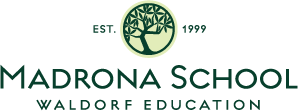Last spring, we were fortunate enough to hear from Seattle Waldorf School’s Tracy Bennett at our spring fundraiser. We’re reprinting her words here, as they offer a voice in our greater community in support of Madrona School and Waldorf education:
Good evening. It is truly a pleasure and honor to be with you tonight, celebrating Madrona School — your children, your teachers, and your wonderful community. I was delighted when Missi asked if I would offer some thoughts tonight, as it gives me an opportunity to say thank you. In my eight years as Head of Seattle Waldorf School, many of our most talented, committed and inspiring high school students have begun their journey in Waldorf education here, in the parks and beaches of Bainbridge Island. We have the luxury — and yes challenge — of adding the finishing touches to these extraordinary works of human development, before they head out into the world. Whether your children’s Waldorf experience spans a single year or more than a decade, I would offer that it is invaluable, and opens their eyes and hearts to the world in ways you may not see now. Trust me — our alumni and Waldorf graduates around the world are a testament to the staying power of Waldorf education.
The internet and papers (I still read hard copy!) are filled with research and reports about the skills today’s employers are seeking — creativity, collaboration, critical thinking, problem solving. This is a familiar list to Waldorf schools, who have long believed in the importance of educating children into capable, competent, and compassionate human beings. I believe we offer something more than requisite skills for success in the workplace, and of far greater importance in the long run — the capacity to find purpose and meaning in one’s life.
As a parent of five children, I realize that what I want more than anything else is for them to find that purpose. I want them to be passionate about their pursuits and to love what they do each day. I am guessing you share similar hopes for your children.
In his book The Path to Purpose, Stanford professor William Damon writes, “To have purpose is to be engaged in something larger than the self; it’s often sparked by the observation that something’s missing in the world that you might provide. Having a sense of purpose is the long-term, number one motivator in life.” Yet, according to his research, “only about 20 percent of high school students report being purposeful and dedicated to something besides themselves. The majority are either adrift, frenetic with work but purposeless, or full of big dreams but lacking a deliberate plan.”
As a result of these findings, schools are now offering programs geared toward nurturing a sense of purpose in students — Future Project, The QUESTion Project, Project Wayfinder, and more. I applaud these efforts to move education away from content-driven curriculum and traditional measurements. At the same time, I cannot help but smile. In Waldorf education, helping students find purpose in their lives is not a separate curriculum or an add-on class. It is what we do. As Rudolf Steiner wrote, “Our highest endeavor must be to develop free human beings who are able of themselves to impart purpose and direction to their lives. The need for imagination, a sense of truth, and a feeling of responsibility — these three forces are the very nerve of education.”
A couple of years ago I sat with a group of SWS alumni sharing their experiences in college and beyond. Listening to these articulate, earnest and balanced young adults was an uplifting affirmation that we are doing it differently here, and need to stay the course despite societal (and occasionally parental) pressures.
What do they value most about their Waldorf education?
Self-directedness,
A curiosity about the world,
A healthy relationship with technology,
A keen interest in learning,
An appreciation for authentic friendships.
One of our graduates offered a moving analogy. Pursuing her passion for theater at Cornish College, Alyssa shared, “When you are preparing for a play, you do what’s called invisible work. It’s everything that’s done before the performance, and it’s really hard. It’s where you deal with your stuff and work through everything so that when you get on that stage it all just happens. I feel like my Waldorf education has been the invisible work of my life. It’s there to support me and allows me to shine on life’s stage.”
This invisible work extends beyond your children. I know this personally, and in closing will share my experience with the magic of Waldorf education.
I have worked in an array of schools in the area, and consulted to dozens of schools more across the country. I was not looking for a position at Seattle Waldorf School in June 2011; it literally appeared before me. I now realize that in fact I was called to come here and join this community to do this incredibly important work. My initial curiosity (with a healthy dose of skepticism) about Waldorf education has grown into a deep commitment to an educational approach that is holistic, nurturing, rigorous, and firmly grounded in what we know about brain research and human development. I believe our world needs strong Waldorf schools more than ever.
But that’s not why I write a check to SWS each year that is larger than any other gift I make by a magnitude of ten. It’s because this education and this community have changed my soul. In the eight years that I have been part of this work, I have learned so much about who I am and how I want to show up in the world. I have made mistakes and been forgiven. I have accomplished tasks and been thanked. I have shared sadness, joy, anger, and anxiety, and been met with compassion and understanding. I have been supported in being human, in a community of other human beings. Every day, as a 60-year old woman, I personally experience the powerful impact of Waldorf education deep within my soul. For this, I am grateful, and for this I give.
I hope you will join me in giving generously to Madrona School, where the seeds of passion, of purpose, and of magical invisible work are planted, and take root not only in our children but in each of us as well. Thank you!











